


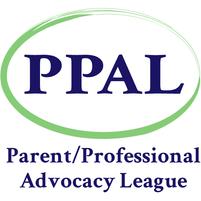










Congratulations! You made it through summer. And hopefully, your child is back at school. How did it go? If you need us, we’re here.
I recently heard a story in my hometown about the first day of school for a small group of middle schoolers. As many towns do, we have a Facebook page that residents post in daily. Often they are looking for services, or help to mow a lawn, or a good restaurant. On this occasion, someone shared a beautiful, heartwarming story, that restores faith in our youth.
It seems that on one of the first days of school, a group of returning middle schoolers were sitting together at lunch in the cafeteria. They noticed a new student sitting alone at another table. They began talking about the new student and a squabble ensued. Now, one might think they were squabbling over how the student looked, where they were from, what grade they were in. But no. Not this group. They squabbled over who would get to go over and invite the new student to join them at their table! What?!!
Doesn’t that just give you goosebumps? I was so excited to hear this. So proud of those of those kids. So thrilled that the new student would be welcomed! The posts on Facebook were hopeful and fun and rewarding! Kids do know how to be good to one another. Let’s believe that and encourage that. Let’s help them look for the good and be the kindness and warmth.
My sincere hope is that if ever your kid is sitting alone, they will be treated with the same kindness. And even better, I believe your kid, whoever and however they may be now, can be the kind one inviting the new kid over to their table. I’m pretty sure you’re showing them how.
CONNECT WITH US!
CLICK ON A TITLE FOR MORE INFO! or visit http://ppal.net/events/

MOVING FORWARD TOGETHER: BUILDING A FOUNDATION OF SUPPORT
Tuesday, September 19, 2:00 - 3:30 PM
ACTIVE PARENTING OF TEENS
Tuesdays, September 19 - November 14, 5:00 - 7:00 PM
WHAT TO KNOW, WHAT TO EXPECT: JUVENILE JUSTICE 102
ACTIVE PARENTING OF TEENS

Thursdays, September 21-October 12, 12:00 - 3:00 PM
THE RIPPLE EFFECT: USING FAMILY EXPERIENCE TO INFORM AND INFLUENCE POLICY CHANGE

Thursday, September 21, 2:00 - 3:30 PM
PANEL DE TRABAJADORES DE LA SALUD DE LA COMUNIDAD
Tuesday, September 26, 6:00 - 7:30 PM
MOVING TO YOUNG ADULT LIFE: A GUIDE FOR PARENTS TRANSITION PLANNING AND POST SECONDARY OPTIONS
Wednesday, September 27, 12:00 - 2:00 PM

What is one interesting fact about you? I grew up in Seoul, South Korea
What have you been enjoying lately?
Youtube!
If you could only eat one food for the rest of your life, what would it be? Spicy
Peanut butter rice
Pamela Bows has always had folks with disabilities in her life. From walking her younger brother to speech therapy in South Korea, to working as an aid in schools in VT and MA, Pamela has spent her time helping others. Working with neurodiverse children in schools, Pamela saw many ways that things could be better for students with disabilities, and started to get herself in trouble advocating for the kids she worked with. She wanted to make a difference reaching beyond the individual students she worked with, so when Pamela learned of an opening at PPAL through a friend at the Federation for Children with Special Needs, she applied, and she’s been with us since!
Representing PPAL, Pamela meets with the Children’s Mental Health Campaign to work on statewide policy for children with mental health needs. Pamela also works on all of PPAL’s communications. Pamela appreciates the way she felt immediately welcomed at PPAL. She values her co-workers and the wealth of knowledge that their lived experience brings to the table. When asked why she enjoys working at PPAL, Pamela said “I like the opportunity to hopefully make a difference on a larger scale.” We’re so glad to be working together with Pamela to do just that!
To seek support from PPAL’s family support staff, fill out our Family Support Request Form!

PPAL's phone: (866)815-8122
Family Support Request Form
PPAL and Youth MOVE Massachusetts want to hear from parents, caregivers, teens and young adults about any roadblocks they’ve encountered trying to get behavioral health services.
As advocates for YOUR voice, PPAL and Youth MOVE Massachusetts use this information to educate state agencies and community partners about the family experience. Your responses are powerful. In particular, the way you describe your experiences helps us illustrate what kind of support and services you and other families need.
This survey should take around 10-15 minutes. All answers are anonymous and results will be reported in aggregate form such as percentages or anonymous quotes.
Please share these short surveys with families and teens/young adults. 2 families and 2 teen/young adult winners will be selected weekly to win a $20 gift card.
Questions: email ksmith@ppal.net

Roadblocks to Securing Support for Your Child: What’s Your Experience?

This survey is for families of children with emotional, behavioral or mental health needs ages 6-26+ years.
Roadblocks to Securing Support: What’s Your Experience?

This survey is for youth and young adults (ages 13-26+) with emotional, behavioral or mental health needs.
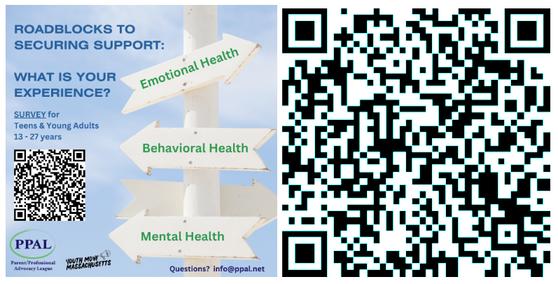
Is your child starting therapy? Are you afraid your child won’t like it? Won’t go? Are you struggling with how to put a positive, upbeat spin on it? PPAL is happy to share some tips we’ve learned along the way.

In 2019, roughly 10% of kids ages 5-17 received counseling (CDC). Still, many kids are reluctant to go to therapy because of the stigma and misconceptions that (inappropriately) surround it. It’s important to “normalize” having a therapist. Show your kids that even as an adult you fully embrace the benefits of therapy and believe it’s an important part of your support system. In fact, if you have your own therapist, make sure to talk with your child about them - or better yet, have them meet your therapist to dispel any scary notions they may have.


Another way to help your child get comfortable with therapy is to teach them what it can offer! It’s not always about just sitting on a couch and talking. There are many different types of therapists and types of therapy (see below for some examples!) A good therapist has a variety of tools to use that might help you focus on an issue or change your awareness about an experience. Good therapists are continually learning, are willing to explore with you, and routinely offer new tools or programs to help!
In addition to individual therapy, family therapy can be very effective for some families. While individual therapy gives us an opportunity to learn about ourselves, family therapy can help us learn to function or solve problems within the family group dynamic. Family therapy can be impactful because it shows that the entire family is committed to making a change, whatever that change is, and allows for problem solving within the actual family dynamic.
Cognitive behavioral therapy (CBT) is a structured, goal-oriented type of talk therapy. Through CBT, you can unlearn negative thoughts and behaviors and learn to adopt healthier thinking patterns and habits. From Cleveland Clinic. Click here to learn more

Children learn through play. Because their verbal skills are not fully developed, children respond to difficult situations through their behavior. Play therapy offers a connection and a natural way to talk about and process difficult emotions or experiences. See the video to learn more about play therapy. Learn More
https://www.youtube.c om/watch?
v=zox3syT2qhk

These two therapies are similar in that they engage your body to reprocess memories. It is effective for dealing with trauma or anxiety, allowing a safe and private place to work on moving through difficult experiences. This treatment doesn't have to be complicated. It can be done directly between the therapist and client. Learn about PC. Learn about EMDR
TThere are several different types of biofeedback therapies, but all of them aim to help you notice and control your physical response to difficult topics. An example of a common biofeedback activity is using a sensor that monitors your heart rate, visualizes it on a computer screen, and then shows you the positive effect that breathing in and out slowly can have on reducing your heart rate. You can see how breathing affects your body in real time. This enables you to learn to use breathing as a technique for countering anxiety when needed. Click here to learn more.
DBT teaches real, tangible and useful skills such as distress tolerance– being able to manage a certain amount of stress in a safe way, interpersonal skills– how to talk about and navigate problems in relationships, and emotional regulation– how to recognize and manage your emotions. While it is becoming more and more apparent that DBT skills can help everyone, research shows that they can be especially helpful for teenagers and young adults who are struggling with finding their place in the world. Learn More
Do you want more tips to get started with your child? Read this article to learn more, including suggestions about exactly what to say to get the conversation started!
ADHD can be very stigmatizing and if often a misunderstood diagnosis. While technically it is a neurodevelopmental disorder, sometimes it is referred to as a biological or medical condition, or a psychiatric condition. Executive skills dysfunction is a symptom of ADHD.
Kids who need support in school for ADHD have traditionally received a 504 plan (see the difference between IEPs and 504s on this tipsheet), but a higher level of need may qualify your child for an IEP, particularly if your child has additional disabilities, or a high level of emotional dysregulation or aggressive behaviors at school.
ADHD has overlapping subtypes, meaning that there are a lot of symptoms to consider when making a diagnosis. Executive dysfunction is seen in all ADHD types. There are generally three subtypes of ADHD:
ADHD Impulsive/ Hyperactive type- least common, does not feature inattentiveness, always busy/fidgeting, may talk a lot or interrupt, difficulty starting and finishing a task
ADHD Inattentive/ distractible type- often overlooked, struggles with organization and planning, often daydreams or zones out, forgetfulness, easily distracted
ADHD Combined type - most common, combines parts of both subtypes.
(From Johns Hopkins)
Heads Up: more than half of those on the autism spectrum have co-occurring ADHD. Many in the autism community consider ADHD to be part of the autism spectrum, and expect that more research will confirm this. You may come across the abbreviation AuDHD, referring to someone who has both Autism and ADHD.
Sometimes ADHD can look like other mental health disorders. The experience of ADHD can lead to frequent mood swings due to frustration or low self image, especially when undiagnosed or under-supported. Difficulty in social situations is common. It is often reported that ADHDers experience huge difficulty managing real or inferred rejection, called rejection-sensitive dysphoria (RSD). (Click here to learn more about this and the difference between RSD and mood disorders).

However, the reason for this connection is not fully known. And, many parents will tell you that their child with ADHD struggles with emotional dysregulation which is not generally recognized in the U.S. as a symptom of ADHD. It is important to remember that ADHD, like all mental health disorders, are simply classifications of a group of symptoms that may change frequently and not be present in all children.
If you’re wondering about your child’s behavior, speak with their pediatrician or give PPAL a call.
From Psychology Today executive Functioning is the ability to “plan, monitor, and successfully execute” goals, and is made up of “selfawareness, inhibition, nonverbal working memory (short-term memory related to sensory and spatial information), verbal working memory (short-term memory related to speech and language), emotional regulation, motivational regulation, and planning and problem-solving.” Executive dysfunction is often seen with trauma, ADHD, anxiety disorders, and serious mental illness. It is not a diagnosis, but rather a symptom experienced by many of us with mental health needs.
Difficulty being on time
Struggles with boundaries
Takes a long time to do what others may do faster
Overlooks details
Quick to frustration
Unable to articulate what the difficulty is
Being anxious often
Tires easily
Checking for attention before delivering instructions
Checking for understanding
Using a timer/watch, setting alarms for length of activities, as reminders, etc
Breaking tasks down into smaller chunks

Giving more time
Frequent positive praise
Seat near front of classroom/ flexible seating choices
Use of fidgets (needs to be explicitly taught how to use them)
 By Robin Richardson, PPAL Family Support Specialist and Communications Specialist
By Robin Richardson, PPAL Family Support Specialist and Communications Specialist
The first weeks of school can be both exciting and stressful. As children see their peers again and take on new academic challenges, it’s important to find a balance that supports their mental health as well as their academic success.
Manage Time: Help your child create a daily schedule that balances schoolwork, extracurricular activities, playtime, and relaxation. Staying organized reduces stress.
Stay Connected: Foster positive relationships by encouraging your child to make friends and maintain connections with classmates and peers. Social support is essential. If your child has difficulty making friends, ask their teacher for help; they can let you know who in your child’s class your child is connecting with, assign your child to groups with possible friends, or even put your child in a social learning group.
Promote Self-Care: Create opportunities for your child to engage in activities they enjoy, such as reading, art, or sports, to foster relaxation and stress relief.
Encourage Physical Activity: Support your child's active lifestyle by providing opportunities for physical exercise and outdoor play. If they are busy, try something simple, like a walk around the block or playing their favorite song and having a mini dance break.
Open Communication: Maintain open and non-judgmental communication with your child about school, emotions, and challenges. Be a listening ear when they need to talk.
Monitor Screen Time: Ensure your child has a healthy balance between screen time and other activities, emphasizing quality family time.
Prioritize Sleep: Establish a consistent bedtime routine and ensure your child gets the recommended amount of sleep for their age group
Ask for Support: If your child is really struggling at school, there may be services and supports the school can offer to help them. Talk to your child’s teacher about what they can do to make things easier for your child, and consider asking for an evaluation for special education services - see our previous newsletter (or call PPAL!) for more information.
If your child receives special education, through a 504 or IEP, there are further steps you can take to ensure that their school needs are met from the start of the year.



Review 504/IEP Plans: Regularly review your child's 504 or IEP plan to ensure that it still meets your child’s needs, and talk to them about their daily schedule to ensure they are receiving the accommodations and support outlined in the document.
Check in with Special Education Teachers: Maintain open communication with your child's special education teachers to discuss progress and any adjustments needed. If you don’t feel like you are getting enough communication from the school, consider asking for daily or weekly check-ins to be part of your child’s 504 or IEP.
Advocate for Needs: If you believe that your child requires additional support or adjustments to their plan, advocate for their needs within the school system. Talk with their teacher, special education teacher, or principal to set up a meeting where you can discuss how your child is doing and what revisions to their 504 or IEP might be needed.

Stay Informed: Attend meetings with school staff and stay informed about your child's progress and any changes to their educational plan. You should be receiving regular report cards, as well as personalized feedback on how your child is progressing towards their 504/IEP goals.
If your child is struggling with the start of the new school year, PPAL can help! Reach out to us online at ppal.net or call 866-815-8122.

Special education programs aren't just about addressing learning disabilities or physical challenges. They also play a vital role in supporting your child's mental health needs.
Children may face various mental health concerns during their school years, such as anxiety, depression, or emotional regulation issues. Special education programs should be equipped to provide tailored support to address these challenges and ensure that all students thrive emotionally, academically, and socially.

Individualized Support: Special education plans can be tailored to meet your child's specific mental health needs. This might include counseling services, behavior intervention plans, or accommodations to reduce stress and anxiety.
Trained Professionals: Special education teams often include counselors, psychologists, and social workers who specialize in addressing mental health concerns. These experts collaborate with teachers and parents to create effective strategies.
Emotional Regulation: Special education can help children develop essential skills for emotional regulation, social interaction, and conflict resolution, fostering better mental well-being.

Open Communication: Begin by discussing your concerns with your child's teacher or school counselor. They can provide valuable insights and initiate the process of assessing your child's needs.
Request an Evaluation: If you suspect that your child requires additional support for their mental health, request an evaluation through the school's special education department. This evaluation will help determine the appropriate services and supports.
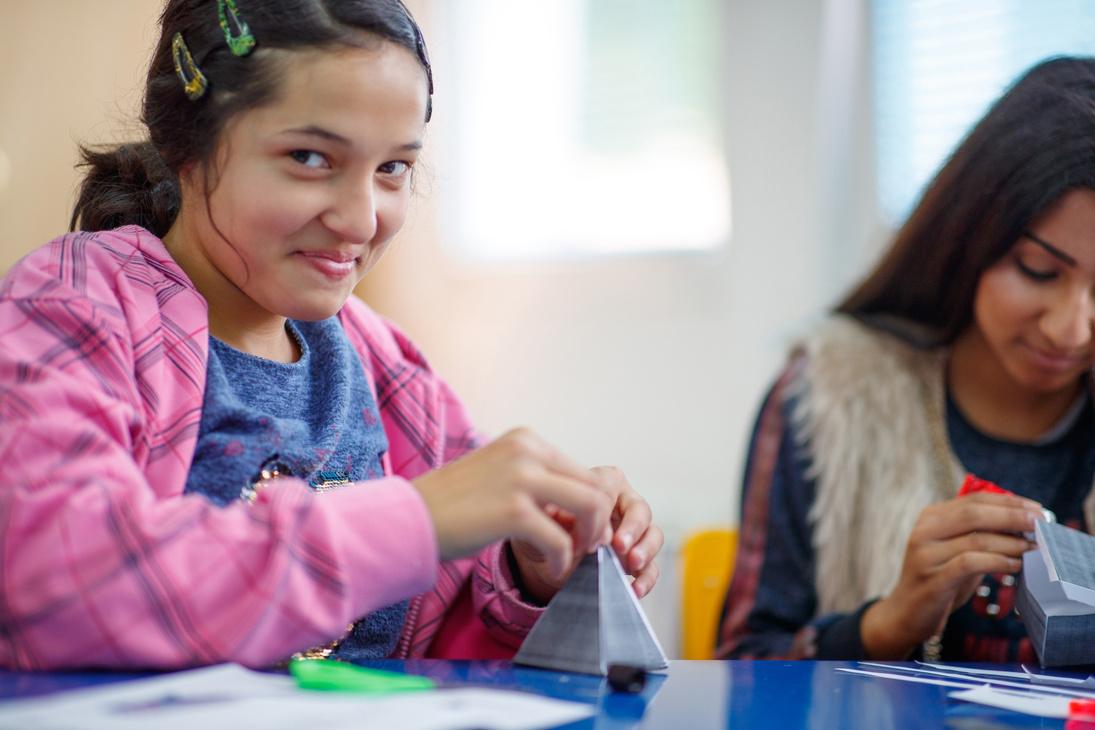
Attend Meetings: Participate actively in Individualized Education Program (IEP) or 504 Plan meetings. These meetings are opportunities to discuss your child's needs, set goals, and ensure that mental health support is integrated into their educational plan.
Advocate for Your Child: Don't hesitate to advocate for your child's mental health needs within the school system. Your involvement is essential in ensuring they receive the support they require.
Remember that special education programs are designed to create a supportive and inclusive environment where all children can thrive. If you believe that your child may benefit from mental health support within the special education framework, don't hesitate to reach out to your child's school - or, as always, to PPAL!
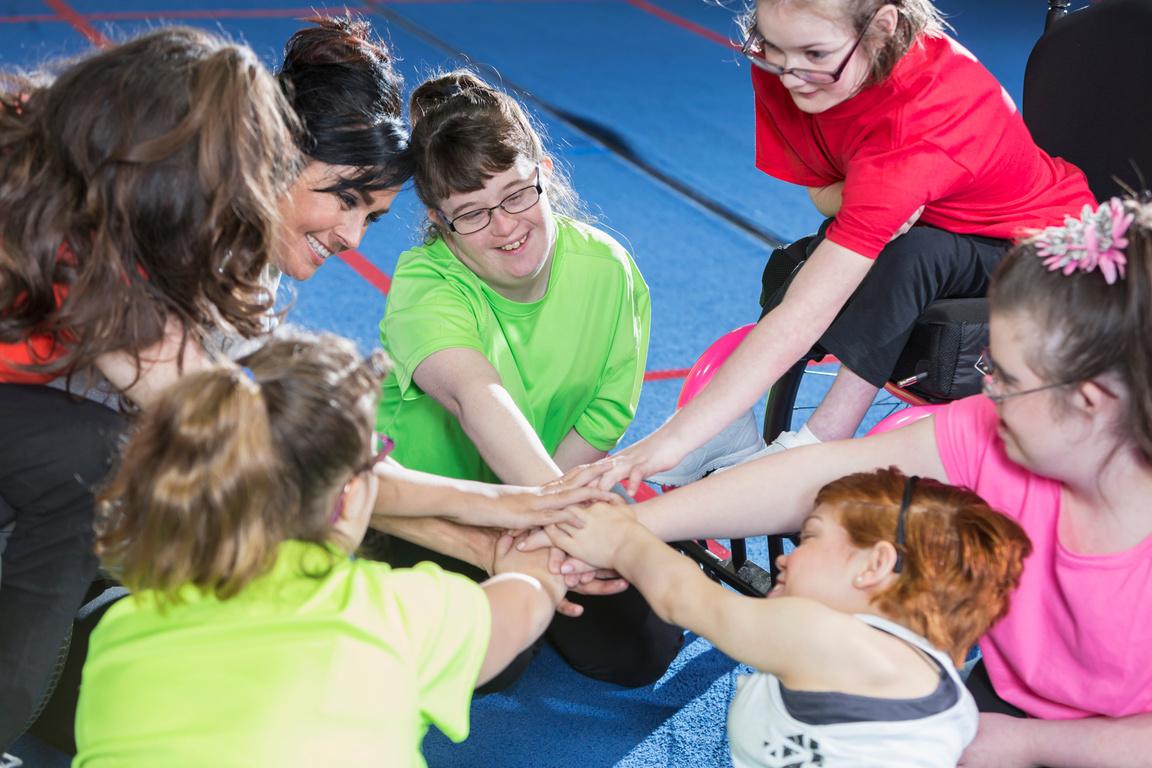



It can be a great resource!
Like PPAL, the FCSN grew out of parents coming together because their children's needs weren’t being met. For the FCSN, this involved educational needs. For PPAL, it involved mental health needs. Since then, the FCSN has grown to provide a wide range of support for children with many types of disabilities in many settings. PPAL, on the other hand, has continued to focus specifically on improving mental health for families and children in Massachusetts. While PPAL helps with school issues for children with mental health challenges, FCSN is a great resource for school-based questions and special education for kids with many types of disabilities. The FCSN also helps support Special Education Parent Advisory Councils (SEPACs), provides a variety of training to parents, and runs Family TIES

PPAL has been proud to partner with the FCSN many times over the years. We are committed to collaborating with community partners to help support families and children in need.
Many schools this year are struggling to find staff. Even if your school cannot provide IEP services because it doesn’t have staff, those services should remain in your child's IEP. If your school district asks you to amend, remove, or stop any services because it cannot deliver the services for any reason, including not having the staff, SAY NO and do not sign an IEP change!!! Your child has the right to the educational services and supports specified in the IEP. For questions or support, reach out to PPAL for help!
When it comes to advocating for your child's mental health in a school setting, establishing effective communication and ensuring that your concerns are taken seriously is essential. Here are some strategies for engaging with schools to create a supportive environment for your child:
Document Your Observations: Keep a record of noteworthy aspects of your child's behavior and emotional well-being. Note good days, bad days, specific behaviors of concern, and any school-related problems your child has shared with you.
Gather Supporting Documents: If possible, bring documentation to substantiate your concerns. This could include your behavioral observations, school progress reports, or even a letter from a mental health professional. Providing written evidence underscores your preparedness and commitment as a parent.
Choose the Right Time: Schedule meetings at a time when you are most alert and focused. Ensure you have ample time to arrive without feeling rushed.
Professional Appearance: Dress professionally, opting for "business casual" attire, and avoid wearing torn or stained clothing.
Bring support: If you find the meeting intimidating, consider bringing a friend or support person to provide additional assistance. They can be involved in the meeting, just take notes for you, or even just be there for emotional support. Remember that you are allowed to bring anyone you want to school meetingsjust let the school know in advance.
If you need help with next steps, reach out to PPAL! info@ppal.net (866) 815-8122

Prepare Background Information: During your initial meeting with school personnel, come prepared to discuss your child's challenges, their developmental history (you can even bring a baby book), and any recent stressors or events that may be affecting their well-being.
Communicate Your Priorities: Clearly articulate your most pressing concerns from the outset. If you want the school to focus on specific issues, make these priorities known.
Set Specific Goals: Share your specific goals for your child's well-being. For instance, express your desire for your child to participate in math class or for them to be able to play with a friend at recess. Describe what success would look like to you.
Maintain a Positive Attitude: Approach the conversation with a calm and positive demeanor. Your body language and tone play a significant role in how your concerns are received.
Seek Guidance: Don't hesitate to ask for guidance, such as, "Can you suggest strategies for addressing my child's..." or "Can you assist me in planning for situations when my child..."

Practice Active Listening: Pay close attention to the responses you receive, as you may discover answers to unasked questions. It can be helpful to take notes to help you stay focused and remember important points. If it’s too much to take notes and participate in the meeting at the same time, ask if you can record the meeting on your phone, or bring a friend to the meeting to take notes for you.
Seek Clarification: If you encounter unfamiliar terms or concepts, politely ask for explanations to ensure you fully understand the discussion. Sometimes schools use a lot of jargon - but it’s their job to communicate in a way that parents can understand!
Emphasize Your Expertise: Remember that you are the foremost authority on your child. While school personnel have expertise in education, you possess invaluable insights into your child's behavior and needs.
Open Dialogue: If disagreements arise, initiate a constructive conversation by saying, "Can you explain your perspective? I have a different viewpoint." Encourage an open and collaborative discussion.
Address Concerns Promptly: If something bothers you, address it immediately. Assume that misunderstandings can occur and seek clarification by saying, "When you mentioned [issue], I understood [interpretation]. Is that what you intended?" or "I felt dismissed when [situation occurred]."

A good mantra to keep in mind when you engage with your child’s school is “if it’s not recorded, it didn’t happen.” Records can include notes, printed reports, emails or other electronic communication, and even audio recordings (if the school gives you permission to make them).
Keep all written communication sent to you by the school - notes from the teacher, progress reports, updates about discipline - everything. Keep printed records in a binder, and either print out electronic records or keep them in a designated place on your computer or phone.
When communication is verbal, you need to create a written record. Follow up phone and in-person conversations with an email summarizing your understanding of the conversation. At the end of the email, ask the school to get back to you if they DON’T agree with your summary. That way, if they ignore your email, they are tacitly agreeing with what you wrote.
All IEP meetings should be followed up, by the school, with a written document containing meeting minutes. If the minutes leave anything out, be sure to follow up, in writing, with what you want to add. If you understand things differently than the minutes reflect, share that as well.
Engaging with schools to address your child's mental health needs effectively requires preparation, clear communication, and an emphasis on collaboration. By following these strategies, you can increase the likelihood that your concerns will be taken seriously, and your child will receive the support they require in an educational setting.


Are you curious about what to expect from school staff who work with your child? If your child has a paraprofessional or one-to-one staff, these are the folks who spend the most time with your child throughout the day. These are often entry-level positions. Staff have varied levels of experience– a great school will make sure their staff are all trained to the same level of base knowledge, but sometimes robust training isn't available until the first school break. School staff often want to have more education, but need help advocating to the district for timely and appropriate training! These school staff, especially at private or therapeutic schools, are the lowest paid employees with the most important job at the school.
If you can, build a relationship with your child’s staff member. There are often rules around personal relationships with school staff, but you can always get to know the staff by chatting briefly with them if you drop your children off, visiting the school and talking to the staff person, writing notes to them, or thinking about other creative ways to build a relationship. You can also request your child’s direct support staff or 1:1 to come to the IEP meeting. It only makes sense– they see your child throughout the day, while the special educator or classroom teacher may not see them for more than a few minutes at a time. Keep in mind, you can ask permission for school staff to work with your child at home– you may want this to be their 1:1 or another school staff with whom they are familiar. Though the school might say no, this can be a great option when you're struggling to find a PCA or home staff on your own.



College life is synonymous with newfound independence, academic challenges, social pressures, and personal growth. While these experiences can be enriching, they can also trigger or exacerbate mental health issues such as anxiety, depression, stress, and more. According to the American Psychological Association, approximately 41.6% of college students report anxiety, 36.4% experience depression, and 35.8% deal with stress during their time in school. This data underscores the importance of prioritizing mental health during college.
Recognizing that you may need help and actively seeking it is a crucial first step. It's essential to understand that asking for support is a sign of strength, not weakness. There are various ways to seek support for your mental health in college:
Counseling Services: Most colleges and universities offer counseling services to students Trained professionals can help you navigate personal challenges, stress, academic concerns, and mental health issues These services are confidential and usually available at no extra cost to you
Peer Support: Connecting with fellow students who have similar experiences can be incredibly comforting Many schools have peer support groups or mentoring programs where you can find a sense of community and shared understanding
Online Resources: Numerous online platforms provide valuable information and resources for college students dealing with mental health issues Websites like Active Minds, The JED Foundation, and NAMI on Campus offer information, tools, and support
Faculty and Advisors: Don't hesitate to reach out to your professors, academic advisors, or other staff members if you're facing academic challenges or personal issues that are affecting your coursework. They can often provide guidance and resources.
Mental Health Apps: There is a growing number of mental health apps designed to support and assist individuals with their mental well-being. Some popular options include Calm, Headspace, and BetterHelp.
Reach out to Youth MOVE, Massachusetts to connect with other young people with mental health challenges and learn how to advocate for yourself and for all youth with mental health needs.
Many colleges and universities are taking proactive steps to prioritize student mental health. These initiatives often include:

Mental Health Awareness Campaigns: Campus-wide campaigns and events that aim to reduce stigma, increase awareness, and encourage students to seek help when needed.

Wellness Centers: Dedicated spaces on campus where students can access resources, attend workshops, and participate in wellness activities.
Mental Health Days: Some institutions have introduced "mental health days" where students can take a break from classes to focus on self-care.

24/7 Crisis Lines: Many schools offer 24/7 crisis lines or hotlines that students can call or text for immediate support.
Your mental health is a top priority, and seeking support during your college years is a vital step towards ensuring your well-being Remember, you're not alone, and there are numerous resources and individuals available to help you navigate the challenges that college life may bring. Reach out, connect with your campus resources, and remember that it's okay to ask for help.

Do you need a break from parenting?
Parents & caregivers need a break and most of the time do not have a way to take break.
How often do you feel like you need a break?
Do you have a way to take a break right now?
If you need help from PPAL right now, request family support here or call us toll free at (866) 815-8122.

Families selected top 2 choices

Someone to take my child out of our home for a few hours
Someone to watch my child for a few hours
Someone to watch all my children for a few hours
Someone to watch my child overnight
Someone to take my child out of our home overnight
It’s clear that parents and caregivers need a break. We see you. We hear you. We are you. PPAL will continue to advocate with state agencies and local providers around this issue. We will continue to ask for creative, out-of-thebox thinking. If you have ideas or solutions, please let us know at info@ppal.net. This really does take a village!

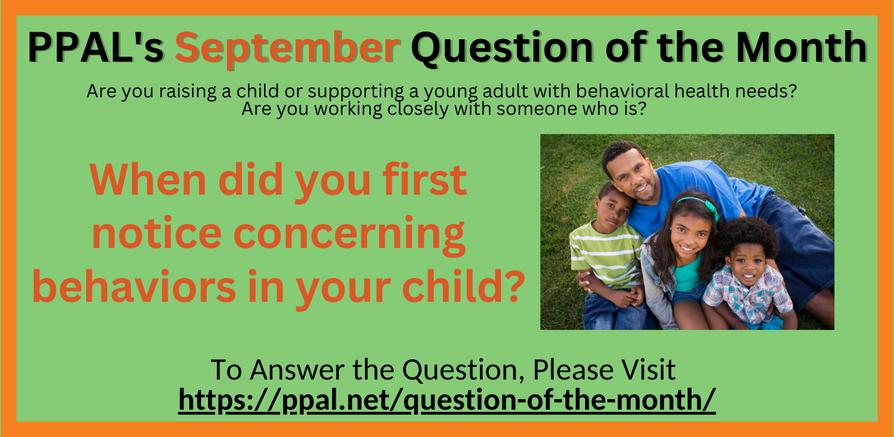
Is your school one of the 170/400 (36%) school districts who have joined the MASMHC?

If not, reach out to your school district and ask them to join the Massachusetts School Mental Health Consortium now!
According to the MASMHC website:
“The Massachusetts School Mental Health Consortium (MASMHC) is comprised of Massachusetts school districts committed to improving the mental health services and supports available to students across the Commonwealth. MASMHC member districts recognize the growing needs of our student populations relative to mental illness and substance use and seek creative solutions to enhance prevention efforts, reduce wait time for therapeutic services, and increase the quality and sustainability of school mental health services and supports. Through shared learning, collaboration, and consultation, member districts will actively engage in efforts to improve the well-being of students in order to support their future success.”






No sign up required for most groups. Groups that do require registration or booking include an email but are not clickable
School
parentsupportgroup@ppal.net
Raising
Join Our Community on Facebook:
PPAL'S PAGE PPAL EN ESPAÑOL PARENTS OF TRANSITIONAGE YOUTH GROUP YOUTH MOVE MA
Create & Connect Parent Support Group VIRTUAL 11:30 AM - 1:30 PM

Parents of Transition Aged Youth (PTAY) VIRTUAL 6:00 PM - 8:00 PM
CLICK FOR MORE INFO!
Click support groups to get zoom link unless otherwise indicated
Grandparents Connections VIRTUAL 2nd Thursday each month 12:00 PM - 2:00 PM
Grandparents Connections VIRTUAL 4th Thursday each month 6:30 PM - 8:30 PM
Sibling Support Program
VIRTUAL
1st Thursday each month
*Pre-Registration Required emily.rubin@umassmed.edu 5:30 PM - 7:00 PM
Caregiver Support Group
VIRTUAL 5:00 - 7:00 PM
PPAL.net/events/

FRIDAY Family Connections VIRTUAL 12:00 PM - 2:00 PM
Support Group for Lynn Families
IN PERSON For families and children
*Pre-Registration Required Email Dalene: ptahsw@verizon.net
Every Other Friday 6:30 PM - 8:30 PM
The Statewide Young Adult Council (SYAC) is a subcommittee of the MA State Mental Health Planning Council (SMHPC) and serves as an advisory board to the SMHPC and the Department of Mental Health's (DMH) Transition-Aged Youth (TAY) Initiative.


Brings together youth, young adults, and providers to provide advice to the Department of Mental Health (DMH) and other young adult service organizations - ultimately creating a cohesive, supportive network of families, peers and service providers throughout the Commonwealth;
Seeks to inspire hope and recovery among youth/young adults across the state;
Empowers youth/young adult voices within DMH;
Encourages young people to advocate for themselves and to assist them in making their own choices/decisions with transitional life skills, including education, employment, housing, and healthcare;

Works together to find equality and advocate for all youth/young adults.
Who can attend SYAC meetings?
SYAC welcomes youth and young adults (age 16+) in MA to participate in meetings!
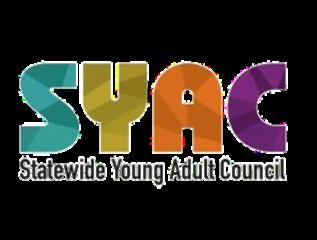
When are SYAC meetings?
SYAC meetings are currently held on the 3rd Tuesday of every month from 2:00-3:30pm.
Where are SYAC meetings?
Due to COVID-19, SYAC meetings are currently held VIRTUALLY via Zoom. For meeting information or to be sent a calendar invite, please contact Colby Mills at cmills@ppal.net.




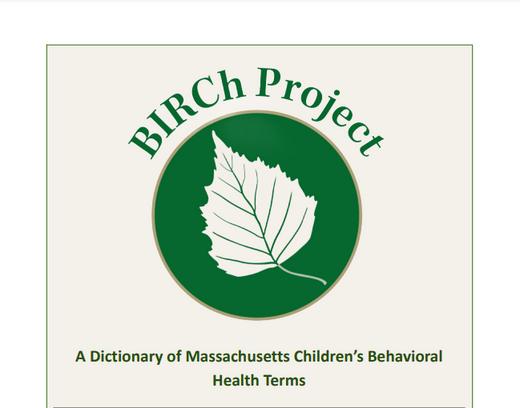







I think the hardest part of having a child with a delay of any kind is the fight: The fight for services.

The fight for people to understand who your child is and what they need. The fight for knowledge, because knowledge is power. And the quiet fight you have within yourself wondering if you’ve left no stone unturned.

 -jessie doyle
-jessie doyle